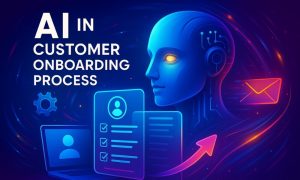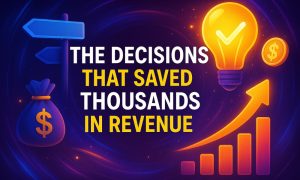
Ai In Customer Onboarding Process
Customer onboarding is one of the most critical moments in the entire customer lifecycle. It’s the phase where expectations are either validated or lost, and

Product management is the process of bringing a product from an idea to market. Both business models—B2B and B2C—share the common purpose of driving their products throughout their lifecycles. So, what is the big deal about B2B vs B2C product management?
In B2B, the product is marketed and sold to other businesses, on the other hand, in B2C, the product is marketed and sold directly to the end consumer. Oversimplification? Well, don’t worry. I have the whole article designed for you to discuss in depth.
So, let’s go step by step starting with what is B2B and B2C management.
B2B product management is known as the procedure that is used to develop and deliver a product to another business rather than an end-user. B2B companies usually have longer relationships with their clients.
The complete B2B product management process includes finding new product ideas, developing a product roadmap, collaborating with different teams to bring the product to market, and managing the product lifecycle to make sure it fulfills the requirements of the target market.
B2C product management is the process that focuses on developing and selling products directly to end-users.
B2B product management involves effective communication, strategic planning, problem-solving abilities, team collaboration, and analyzing customer feedback. A successful combination of these qualities results in a product that consumers enjoy.
Switching from B2B to B2C product management can be tough, but not impossible. It opens up huge possibilities for gaining new experiences and learning new skills. The following steps might help you if you are trying to figure out how to move from B2B to B2C product management.
Switching from B2B to B2C might appear challenging at first, but keeping up with industry knowledge and proper implantation of the aforementioned steps might greatly boost the possibility.
Let’s check some of the key differences between B2B vs B2C Product Management at a glance:
Key Factors | B2B | B2C |
Release Patterns | Not frequent | Frequent updates |
Revenue | Comes from some high-value transactions | Many smaller transactions |
Industry experience | Required | Not mandatory |
Data and A/B Testing | Less scope for data analysis and A/B testing | Data-driven. A/B testing friendly |
Features or Usability | Features | Usability |
Buyers and end users | Buyers are not users | Buyer, users are the same |
Customer support setting | Technical | Transactional, simpler queries |
B2B products are usually made for businesses. People become used to the UI and process as they use these products for a prolonged period of time each day. This is why B2B products don’t get frequent updates and have a longer development cycle.
Also, it goes through extensive testing, research, and validation prior to the final release to ensure a bug-free B2B product upgrade.
On the other hand, B2C products usually have shorter development cycles and get frequent small improvements in UI or functionality. It’s crucial to release continuous updates to retain B2C users’ attention. Users can report bugs and opt to be beta-testers for upcoming features.
Though B2B businesses have fewer customers than B2C businesses, their revenue comes from these small but highly valued customers. Typically these customers are enterprises that pay for the product. Sales teams are often responsible for generating revenue for B2B businesses.
Contrary to that, B2B targets a wider range of audiences and often generates a high volume of sales through millions of smaller transactions. These transactions might come for upgrades, subscriptions, or any in-app purchases.
The B2B industry typically demands prior industry experience. In this sector, selling specialized products and solutions requires a high level of expertise. A B2B product manager who doesn’t have extensive industry knowledge will face immense difficulty leading the team toward the goal.
B2C companies focus more on connecting with customers than on industry knowledge. Sure, having industry knowledge is an advantage, but the ability to understand customers’ pain points and develop a product as per their requirements is what it takes to thrive in the B2C industry.
More customers equal more data. Since B2B business comes with a smaller number of customers, it limits the bar for data collection and provides less space for running A/B tests. B2B can still be data-driven, but due to its inaccuracy, it’s more hassle than it’s worth.
On the other hand, a B2B business consists of a pool of data because of its millions or billions of users. Product teams can analyze this data, create product roadmaps and even run multiple A/B tests at any given time. B2C is known as a completely data-driven department.
B2B products are typically complex and customized for specific industries. This leads to B2B companies heavily focusing on product features since their customers rely on them to get their job done. For instance, a B2B software user might not have concerns about the UI if it completes its core task.
Contrasting with B2B, B2C is all about improving usability. If a consumer doesn’t find an app’s UI appealing, they might instantly switch to an alternative. B2C product managers focus on developing products that offer a seamless user experience to mass customers.
Both B2B and B2C have different sets of buyers and end users. In B2B business, buyers are not users. Usually, organizations purchase B2B products to use them in the manufacture of their own products or to improve the performance or efficiency of their business.
B2C product buyers are usually the users. They purchase these products or services for personal use, considering the price, design, brand, and value proposition.
Both B2B and B2C product managers research their consumers to better understand their pain points and develop products accordingly. Where B2B considers company size, job title, budget size for analysis, B2C focuses on age range, gender, race, income, hobbies, and interests.
In a B2B setting, customer support typically entails working with a designated representative from the customer’s company, like an account manager or technical support person. These professionals might address technical issues that the B2B company must resolve in order to establish a long-term partnership.
Customer support in B2B organizations is more transactional and focused on providing quick solutions. It might require working individually with customers, such as answering their queries or solving issues with purchases.
Yes. A product can be sold both B2B and B2C. With the help of different marketing strategies and pricing models, many companies successfully sell their products in both markets. For instance, Microsoft sells its Microsoft Office software in both personal and professional plans.
Are you willing to sell your products in both B2B and B2C markets? Good news for you! You will find multiple automated marketing tools to segment your B2B and B2C sales plans and measure the outcome of campaigns.
To summarize B2B vs. B2C product management, they differ in the target market, sales process, and product development markets. While B2B products are designed for a more specific market, B2C targets the mass. Their attributes change accordingly.

Customer onboarding is one of the most critical moments in the entire customer lifecycle. It’s the phase where expectations are either validated or lost, and

I bet you have hardly gone through that feeling when you’re not just keeping customers around, but they’re actually a golden key for you to

Have you ever faced the hurdle of a customer quietly disappearing? You check the dashboard and see that the churn numbers are just rising. Wondering!!!!

Imagine your Customer Success team had a GPS for customer journeys? Amazing right? Using that, you navigate the twists and turns before hitting any roadblocks

Imagine you have a crystal ball like we see in movies that tells you exactly when a customer might be slipping away, or when they’re

Let’s say you spot a single signal from a customer. It is like a dip in usage, a subtle change in behavior, or maybe a
Start your journey toward streamlined workflows, improved sales, and stronger customer relationships today.